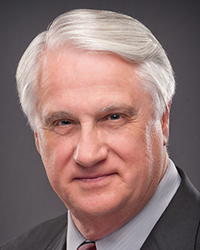

by Daniel H. King, Sr.
Synopsis: Edification is the process whereby Christians “build up” one another in the faith. This carries an important implication: the church is in the building business—it is not a wrecking crew.
What is edification, and what does it mean to edify someone? Scripture gives us an important hint in the following phrase: “. . .unto the building up of the body of Christ” (eis oikodomēn tou sōmatos tou christou). This is the third of Paul’s descriptive clauses offered in Ephesians 4:12 in order to define the objective, goal, and work that the church has as its mission in the world. Each is anchored by a verb in the English translation. Each verb is active rather than passive. In the original, they are all three nouns. In this case, it is oikodomēn, a noun from the combination verbal form, oikodomeō, “to build up, edify, benefit, strengthen.” The word oikos signifies a “house,” and the verb demō means “to build,” so, its sense is “to build a house.” Grasping this concept helps us understand the meaning of “edification.” This word picture is at the heart of the biblical idea.
You will observe that in the English versions, the word “edification” is not used in this context, but in the original language, it is clearly present. The term itself in its form as a noun (oikodomē) refers to “an edifice or building,” and so figuratively of the church as God’s “building” (1 Cor. 3:9; 2 Cor. 5:1; Eph. 2:21), and finally in the sense of “edifying, edification, building up” God’s spiritual house (all definitions are taken from BAGD).
Thus, the church of Christ is provided with leaders (apostles, prophets, evangelists, pastors, and teachers [v. 11]) in order for them to function in the community of believers “for the equipping of the saints, unto the work of serving, unto the building up of the body of Christ.” That is their task, their function, and their reason for existing as an organization. Everything we read about in the New Testament involving church action somehow or other fits into one of these three purposes.
At the same time, it should be noted that several passages spell out individual actions taken with an identical plan in mind. This is to be expected, however, because the church is the band of local believers. At times, they act in concert with one another; at other times, they operate individually and severally. Always, whether acting as individuals or corporately (together) when they behave faithfully, they are consistently seen as acting in conformity with the apostolic mandate laid out in Ephesians 4:12.
On the practical side, a number of texts reveal to us how, and in what ways, the early church carried out the Lord’s plan for the church as an edification society, i.e., a community of people who strive for mutual “building up” or edification.
Like other aspects of the Christian system, edification is not about self alone. It is about surrendering to the good of the whole body. Selfishness has no place in Christianity. No less a topic than gifts of the Holy Spirit are employed to advance our understanding of this principle. This is the point Paul labored to make to the jealous Corinthians: “On the other hand, the one who prophesies speaks to people for their upbuilding and encouragement and consolation. The one who speaks in a tongue builds up himself, but the one who prophesies builds up the church. Now I want you all to speak in tongues, but even more to prophesy. The one who prophesies is greater than the one who speaks in tongues, unless someone interprets, so that the church may be built up” (1 Cor. 14:3-5). Plainly, Paul wanted the Corinthians to act in the interests of the entire group, and not only for the sake of the individual. As proud as those who possessed the gift of tongues were of their special ability, that ability had to remain subservient to the mutual benefit of the church as a whole. If it could be used to benefit everyone, then it should be put to work. If not, then it was to remain quiescent. God deployed the gift, not only for the benefit of the individual who possessed it, but also for the edification of the entire church. This should always be the rule that guides a congregation in a local setting.
This was the point Paul was making in Romans 14:19 when he pled for peace and harmony among brethren who differed over incidental matters: “Follow after things which make for peace, and things whereby we may edify one another.” Growth and strengthening, spiritually speaking, cannot progress where quarreling and fighting are present. That is why Paul urged the Romans to learn to get along. A healthy church today is one that has learned to set aside minor differences and concentrate on what it shares in common: faith in Christ Jesus as Lord, and sound doctrine rooted in the clear teaching of the Word of God. “Doubtful disputations” (Rom. 14:1, KJV) and “quarreling over opinions” (ESV) do not create a climate for spiritual growth and mutual edification.
All of us know well the long road of abuse of authority that led to present-day Catholicism. Apostles were given authority in the churches for the benefit of all. They brought order and singularity of purpose and meaning to the thousands of churches that sprung up in the Greco-Roman world in the first few centuries after the Lord’s ascension back to heaven. Elders were appointed for the local congregations as well (Acts 11:30; 14:23; 15:2, 4, etc.). Every local church was expected to develop men with the talent to serve in this role (Titus 1:5). When appointed, elders were to be respected and obeyed (1 Pet. 5:5; Heb. 13:17). Nevertheless, they were not to misuse or abuse the authority given to them (1 Pet. 5:3).
Paul understood this principle well. Moreover, he applied it to himself to maintain a healthy balance between authority and the native independence of others: “For even if I boast a little too much of our authority, which the Lord gave for building you up and not for destroying you, I will not be ashamed” (2 Cor. 10:8; cf. 13:10). Abuse of power has destroyed many congregations over the years. Those who have it conveyed upon them by a trusting congregation must not allow it to “go to their heads.” They must use it in the best interests of the local church, to which it is limited, and strive to bring about the “building up” of the church and not its demolition.
This is not difficult to understand. Anyone who has ever raised a garden readily comprehends the concept. Garden plants love good fertilizer and healthy soil amendments. If you give one part of the garden an appropriate sprinkling of fertilizer around the roots, you will see the difference in the plants that were amended in just a few weeks. They will be greener and healthier, and they will have grown bigger and taller than those that were unfertilized. They will also yield more and better vegetables.
However, if you give them too much, you will see the opposite reaction. They will yellow and fade, and they may even die. We call this “burning” the plants. Too much fertilizer is like putting poison on the plants. Too much of a good thing can be destructive. This can be true regarding our preaching and teaching as well. Too little of sound doctrine can lead to ignorance, and the church may fall away from the faith (1 Tim. 4:1ff). Yet, a diet of only sound doctrine without exhortation and encouragement will cause us to be lacking in empathy, spirituality, and enthusiasm. So, as Paul said, “All things are lawful,” but not all things are helpful. “All things are lawful,” but not all things edify (1 Cor. 10:23). What we do as a church must be for its growth and benefaction. We must keep it in mind that “not all things edify.” Hence, anything that will do it harm should be avoided.
Jude encouraged those to whom he wrote in his little epistle, “But you, beloved, building yourselves up in your most holy faith and praying in the Holy Spirit, keep yourselves in the love of God, waiting for the mercy of our Lord Jesus Christ that leads to eternal life” (vv. 20-21). Too often, people “go to church,” expecting the Bible class teacher or preacher to edify them. Hopefully, that will be one of the results of their attendance at worship services.
Yet, if that is our attitude when we attend, we may well be disappointed, for then we are looking only outwardly and not inwardly. Edification begins at home with me. It is my responsibility to grow and mature through daily Bible study and fervent prayer. When this happens, then I can attend worship and share with others what I have gained by my own personal study and spiritual advancement. Remember that Jude emphasized that we should build ourselves up “in the most holy faith.” The faith should be at center stage in our commitment to personal advancement. True faith has its roots planted deep in the wholesome soil of the Word of God (Rom. 10:17).
This brief article has utilized almost every passage in the New Testament that deals with the topic of edification, at least in the sense in which it is employed to describe the purpose of the church in Ephesians 4:12. Clearly, then, these are the main principles that God wants us to imbibe to appreciate the true nature of oikodomēn, spiritual “upbuilding.”
Arndt, William, et al. A Greek-English Lexicon of the New Testament and Other Early Christian Literature (BAGD). Chicago: University of Chicago Press, 1979.
Author Bio: Dan has preached for the Locust St. church of Christ in Mt. Pleasant, TN for six years. The church website is lscoc.com. He can be reached at danielhking@hotmail.com.

